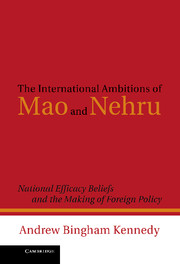 The International Ambitions of Mao and Nehru
The International Ambitions of Mao and Nehru 9 - Conclusion
Published online by Cambridge University Press: 05 January 2012
Summary
The preceding chapters of this book offer three principal findings. The first is that Mao and Nehru came to power with very different national efficacy beliefs. Whereas Mao was highly confident in the military sphere but much less confident in the diplomatic sphere, Nehru was just the reverse. These contrasting beliefs stemmed from the different paths that these two leaders had taken to power. Mao overcame a host of daunting military challenges in the course of the Chinese Revolution, but his diplomatic accomplishments were much less impressive. In contrast, the Indian independence struggle provided Nehru with a wealth of experience in diplomacy and nonviolent remonstration, but no military experience. Nonetheless, Mao and Nehru's beliefs were not simply determined by the different processes through which their states were formed. The way in which these leaders interpreted the triumphs that brought them to power was crucial as well. Indeed, even though Liu Shaoqi and Vallabhbhai Patel experienced the Chinese Revolution and the Indian independence struggle, respectively, they possessed different backgrounds and different personalities, and they interpreted these experiences differently than Mao and Nehru did. As a result, Liu did not develop Mao's strong sense of martial efficacy, and Patel did not acquire Nehru's great sense of moral efficacy.
The second finding is that Mao and Nehru's national efficacy beliefs shaped their foreign policies in important ways immediately after they took office. Chapter 4 demonstrated that Mao's beliefs prompted him to act with military boldness and diplomatic caution after the Korean War broke out. On the military side, Mao's martial confidence inspired him to anticipate remarkably positive outcomes if China intervened in the conflict, notwithstanding its material disadvantages. He thus pressed for China to enter the war in October 1950, even as North Korea was collapsing. The objections to this move raised by Liu and others make it clear that a leader with less martial confidence would have stayed out of the conflict. Subsequently, Mao's martial confidence combined with his much weaker sense of moral efficacy to produce a highly cautious approach to wartime diplomacy in early 1951. Whereas a leader with more diplomatic confidence and less martial confidence would almost certainly have seized the “golden opportunity” that emerged to initiate negotiations with the United States at this time, Mao decided against it. As a result, he missed a chance to rest his overextended troops and to end the war on better terms than he ultimately did.
- Type
- Chapter
- Information
- The International Ambitions of Mao and NehruNational Efficacy Beliefs and the Making of Foreign Policy, pp. 238 - 252Publisher: Cambridge University PressPrint publication year: 2011


